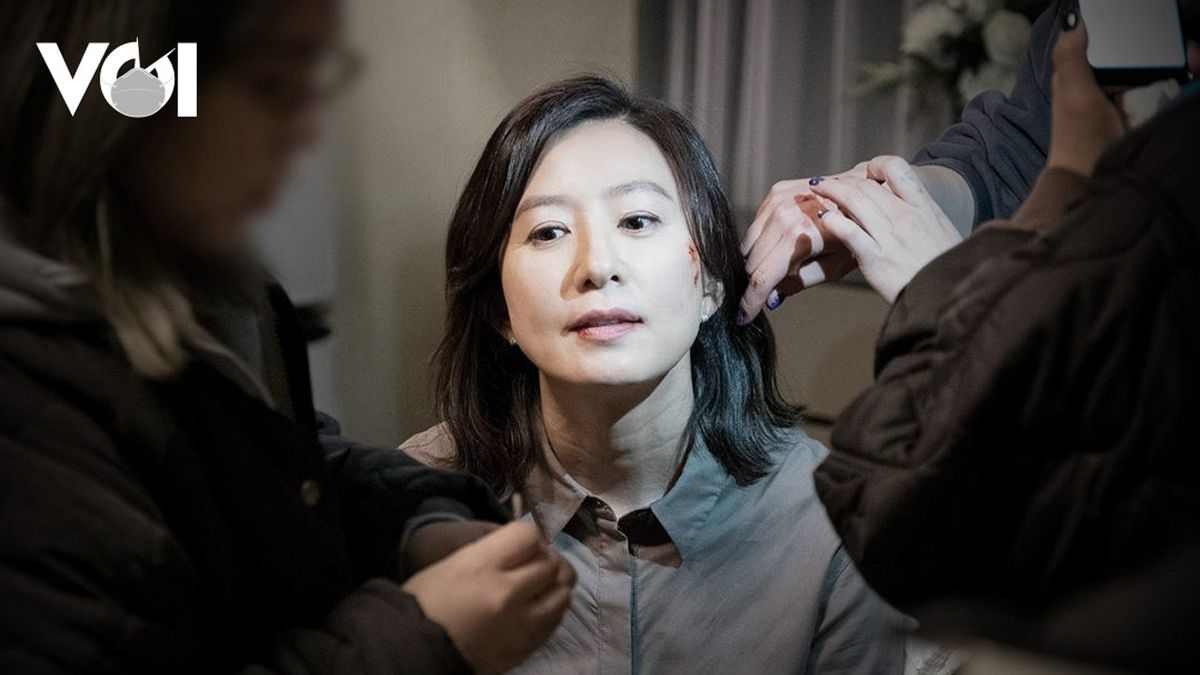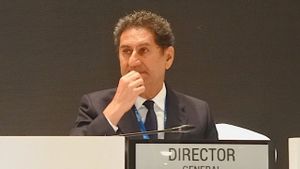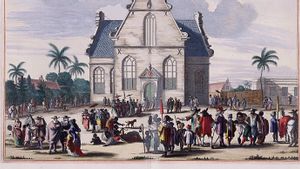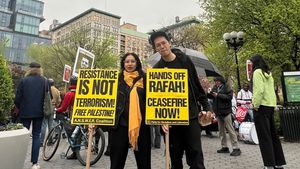
The article "North Korean Film Industry Built on Propaganda and Kidnapping of South Korean Director Shin Sang-ok" has taken us briefly into the fascinating story behind the North Korean film industry. Part of VOI's signature Series, "Korean Drama Invasion", we now return to South Korea to see how the entertainment industry, particularly film and television dramas, was developed. The government plays a big role.
Drakor The World of the Married broke various records. A small symptom of the continuing success story of the entertainment industry in South Korea. The bigger symptom is the dominance of drakor shows as the main spectacle of people, especially in Asia. On Netflix, for example. Based on a Straits Times report, last April, Crash Landing On You and Itaewon Class occupied the top ten most-watched films on Netflix Singapore.
On another streaming service, Viu, The World of the Married dominated the broadcast by drawing 55 percent of Viu's viewers. In addition, other Korean drama series that are among the most watched are When The Weather Is Fine (2020) and Meow The Secret Boy (2020). Even so, the last title is called Drakor with the worst rating.
A number of literates call the 2000s the beginning of the expansion of Korean dramas in the world, when titles such as Winter Sonata and Full House filled television broadcast hours in various Asian countries. Then, the invasion continued in 2009, when Boys Over Flowers was produced by KBS. The story of Gu Jun Pyo (Lee Min Ho) and his gang, F4 is so crazy.
For Lee Min Ho, Boys Over Flowers marked his career. Since then, he has often been asked to star in popular dramas, including The King: Eternal Monarch, the title he is currently working on. Not only characters and stories, Boys Over Flowers shows are also attached to the accompanying song titled Paradise, which was sung by the T-Max group.
The relationship between Boys Over Flowers and T-Max and his song Paradise is an example that can answer a lot of debate among those who drifted into the Halyu Wave. Is it true that Drakor supports the K-Pop industry? Or vice versa? An observer of South Korean culture who is also a lecturer in the Korean Language Education Study Program at the Indonesian Education University (UPI), Ashanti Widyana, said that the greatness of K-Pop cannot be separated from the popularity of drakor. Winter Sonata is a milestone.
"Actually, the most famous K-Pop is from the second generation. For the first generation, the ones that are famous are like GOD and HOT. The market is still in Korea. Even the farthest is in China or Japan to get here (Indonesia). "But, in 2002, to be precise when there was a World Cup 2002 in South Korea-Japan and the Winter Sonata dramas began, people started to get more interested in the drama," said Ashanti.
"Because in the past, K-Pop groups were not like they are now (still a little) still limited in audience. The turning point of K-Drama in Indonesia from 2008 to 2009, especially if the drama was Boys Before Flower, because at that time people were familiar with the mainstream. K-Drama is there, although there are also those who knew from the beginning even though only a few markets, "he added.
After the Boys Before Flower series, the song Paradise, and T-Max in 2009, other K-Pop groups emerged, starting from Super Junior, TVXQ, Shinee, and other groups that developed in Asia. "So, Indonesians (knew K-Pop) in 2009. However, from 2009 to 2010 the K-Pop groups were still slowly being known, until finally they continued to develop again. Starting from there are third generation K-Pop groups, such as EXO, BTS, and all kinds until now there are so many K-Pop groups.
Different and totalIn Ashanti's eyes, there are two keys that make Drakor so attractive and able to invade the entire world: different and total. According to him, Drakor provides so many choices of themes to the audience. Not only drama of tears and passionate love. Meow The Secret Boy, for example. The title offers an interesting fantasy drama, telling the story of a cat transforming into a man. Apart from fantasy, Drakor is also able to bring real events to the screen. TvN production signal, for example. The drama raised the serial murder of Hwaseong, who only found the main suspect in 2019.
Apart from telling fantasy stories and real events, the Drakor industry also has the ability to adapt and cultivate cliches. Last year, for example, when a drama related to the medical world was selling well, other titles emerged. Call it Dr. Romantic to Doctor Prisoner. About adapting. The developments are real. Audiences thirst for novelty. That is what the South Korean entertainment industry players are currently facing and living. Today, when fantasy is so popular, they produce superior titles, such as Hi Bye Mama or The King: Eternal Monarch.
All the theme choices were combined with the totality of the drakor industry players. About design production, for example. The royal-themed titles are the most highlighted by Ashanti. Mr. 2018's Sunshine, for example. The title raises the history of the Japanese invasion of Korea. The production of the title was done very nicely. Not only succeeded in concocting historical stories into digestible consumption, Mr. Sunshine was also successful as a propaganda tool and promotional medium for South Korea. “South Korea is not afraid to explore royal dramas. they are right in totality, "said Ashanti.
From country to countryRegarding the medium of promotion, the South Korean entertainment industry from the beginning was built to meet this need. The South Korean entertainment industry has not only succeeded in becoming a cultural product and a source of income, but has also managed to boost other aspects of the domestic economy. Call it travel, food, or souvenirs.
Goblins, for example. The title succeeded in elevating Youngjin Beach in Jumunjin to a very popular tourist spot. Triggered from the meeting scene of Eun Tak (Kim Geoun) and Goblin (Gong Yoo), the manager of the tourist spot even provides a property in the form of flowers and red scarves that allow visitors to imitate the original scenes in Goblin.
Besides Goblin, Winter Sonata also had the same effect. Shooting on Nami Island, the title managed to lift the island's popularity. The statues of Kang Joon Sang (Bae Yong Joon) and Jeong Yoo jin (Choi Jiwoo) were even built on the island as a memorial to the greatness of the Winter Sonata.
Not only tourism, several food and beverage brands are also exported to various continents because of frequent PPL (product placement). Finally, the audience is 'hooked' to follow what the players consume and wear in the drama. One of them, Mango Six, which Lee Min Ho visited in the drama The Heirs.
The big effect of the drama made Mango Six expand into the United States (US). Uniquely, the PPL installation in this drama was inserted naturally and became part of the story.
As a government promotion media, usually the Korean Ministry of Culture logo appears on the end credits. Not just appearing. This shows that the government has a big share in the impressions produced.
Government supportSince its inception, the South Korean entertainment industry, including Drakor, has been a giant project of the South Korean government. Quoted from the era.id article, there are at least three institutions or institutions that are specifically responsible for ensuring the continuity of the Hallyu Wave distribution. These institutions are KOCCA, KOFICE, and KTO. The three institutions are established under the coordination of the Ministry of Culture, Sports and Tourism of South Korea (MCST).
KOCCA or Korea Creative Content Agency is a South Korean government agency that is responsible for the advancement of South Korea's creative context, at home and abroad. KOCCA as an incubator for the South Korean creative industry is responsible for various industries, from music, fashion, broadcasting, games to animation. KOCCA also has the authority to take care of licensing and intellectual property rights issues.
Next, KOFICE or Korea Foundation for International Cultural Exchange. This institution carries out a cultural exchange mission and academic programs. KOFICE is an agency with a direct mission of introducing South Korean culture, especially Hallyu. Under this institution also run a language development program and the introduction of South Korean culture: Enhancement of Korean Studies and Language Overseas and The Korea Foundation Cultural Center.
The third is the KTO, aka the Korean Tourism Organization. This institution is responsible for the development of culture and tourism which has a direct impact on the country's foreign exchange. This institution is also an important bridge to accommodate the potential benefits of the country from the arrival of foreign tourists who are sucked in by the sparkling Hallyu. The scope of the KTO is among the broadest because the tourist attractions being undertaken are attractions that have been - and will be - introduced in various Hallyu content, be it drama, games, or music. Through the distribution of Hallyu, the KTO is also responsible for shaping the stigma of attracting South Korea.
Magic adaptabilityApart from the various things above, there are other magical things from the South Korean entertainment industry, especially drakor. If you are a loyal Drakor audience, you must have encountered popular titles which in fact are the adaptation of other titles produced by other countries. The World of the Married, for example, is an adaptation of the British series Doctor Foster. Drakor's interesting tendency in this case is their ability to concoct a title that doesn't sell well.
The first drama that was the result of another series adaptation was tvN's The Good Wife. The Good Wife is an adaptation of the American series of the same name. Starring Jeon Do Yeon and Yoo Ji Tae, this drama managed to attract the attention of viewers thanks to its unusual story. Its rating reaches 5 percent, which is high for cable television broadcasts. In addition, in 2018 there is the drama Life on Mars which was adapted from the BBC One series of the same name. The story of a detective's journey to the past makes this drama a conversation and is rewarded with a request for its second season.
Not just a serial. Drakor also often adapts webtoons and comics. Meanwhile, to buy a serial license, usually the adaptation script is thrown into the auction market for sale. This was disclosed by the BBC in its official statement when JTBC purchased the original Doctor Foster script for its adaptation.
This plan has been announced since 2018, but will only be realized in 2020. The collaboration between BBC and JTBC through Doctor Foster's adaptation has made JBTC move forward in adapting other BBC series such as The Split and Undercover which were confirmed in early May.
Not always with a license. Some K-dramas are also plagiarism. SBS's It's Okay, It's Love has a promotional teaser mimicking Celia Rowlson-hall's Olive Juice short film. The production team apologized on the day of the press conference and officially deleted the four teaser videos.
My Love From the Star is also suspected of plagiarizing the NBC television series, New Amsterdam, because in its transition to its modern era, it is considered to have copied the scene from the American series. Even though there was no official statement from the production team or the television station, this had become a conversation among the audience and regretted this had happened.
There are many factors behind the successful adaptation to Korean dramas, namely the concept that is fresh and different from the story plot in general, and the courage of the production team to take a new step away from the clichéd drama. With the adaptation of the foreign version, the production team wanted to introduce a new genre in Drakor. So far, the series adapted are also considered adult and mostly aimed at 21 years and over, different from the dramas that can be watched from teenagers and adults.
Follow this edition of Writing Series: Drakor Progress Under the Shadow of Patriarchy and LGBT
The English, Chinese, Japanese, Arabic, and French versions are automatically generated by the AI. So there may still be inaccuracies in translating, please always see Indonesian as our main language. (system supported by DigitalSiber.id)












